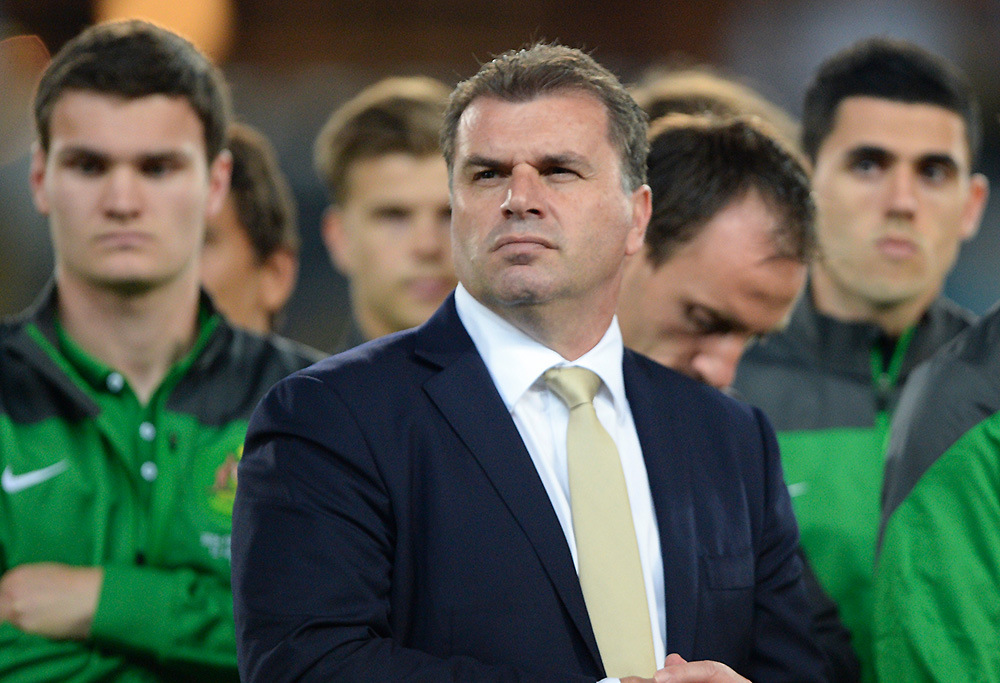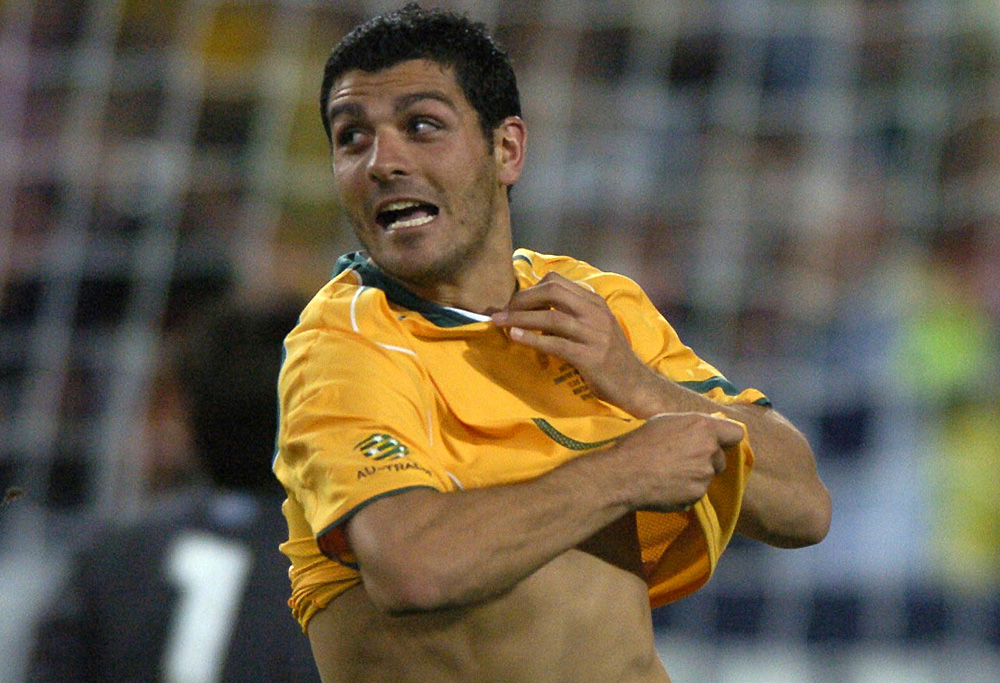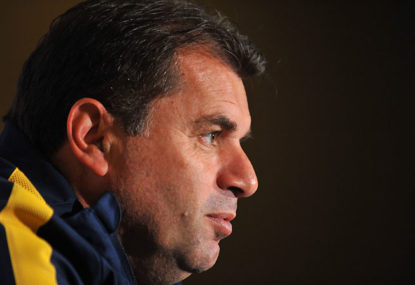Its three years since Ange Postecoglou has taken charge as head coach of Australia’s national men’s football team.
He now embarks on his second attempt to qualify Australia for FIFA’s World Cup finals tournament. His first FIFA World Cup tournament was of course Brazil 2014.
Even though the Socceroos failed to win a game at that tournament, his time in charge was considered to be some sort of success. His demand for possession-based, attacking football in the 2014 World Cup earned him some respect and a few new friends.
He then delivered this country the historic 2015 Asian Cup silverware when the nation’s playing stocks were supposed to be at an all-time low, following a clean out of ageing players of the Golden Generation, with of course the exception of Tim Cahill.
Now, on the brink of the Socceroos making a fourth consecutive World Cup Finals appearance, Postecoglou is driven to continue his evolution and for the team to continue to improve. There are no guarantees in life and as in 2014, he faces an uphill battle to take one of the two automatic finals spots in this AFC qualifying group.
On 27 August 1965 Ange was born in Nea Filadelfia, Athens, the modern day capital city of Greece. Now 51 years old, his family migrated to Melbourne, Australia when he was five years old. Growing up in Melbourne, the second largest Greek community in the world, he played Aussie rules and supported the Carlton Blues.
Carlton is one of the eight founding members of the Melbourne Rules competition of 1897 and has a long and proud tradition in Australian rules. The club originally represented the suburb of Carlton in Melbourne’s inner north, and its nickname of the Blues comes from the predominantly navy blue colour of its playing uniform.
Carlton had historically been one of Australian rules’ most successful clubs, having won sixteen senior premierships throughout its history, equal with Essendon as the most of any club.
What’s wrong with that? Doesn’t everyone growing up in Melbourne play Australian rules, even the Socceroos coach.
Eating funny, foreign food and talking about soccer didn’t get you much attention or win you many friends in the Carlton schoolyard in an era of wall to wall Australian rules.
“There was a while there when I didn’t love soccer” confessed Ange, “I loved Australian rules. It was the way you fitted in. You want to fit in and not be the kid with a long surname that doesn’t fit in. Sport is the boys’ common denominator in the schoolyard jungle.”
That experience taught Postecoglou resilience and a strong determination for what he really wanted to do, because his love for the game of football was being severely tested. He had to make a decision between football of his homeland and Australian rules of his newly adopted country.
It would have been so easy to become one of the Aussie rules followers instead. It would have been so tempting to take part in the mockery of all things foreign, like soccer, even though it was one of his father’s great loves.

How he responded to those strong, opposing influences on his young life and how he gathered the courage to go against the flow was to shape and determine his football career, his life’s philosophy and his great passion to take other Australians with him on a lifelong football journey.
Postecoglou’s experiences over the years and his subsequent rise to the top of Australian team sport and his appointment as Australia’s national men’s football team head coach, mirrors the vicissitudes of the wider world of Australian football and the highs and lows the game and its followers have experienced in Australia and not just Melbourne, over that time.
For many, football was once seen as a foreign invader that wasn’t Australian and had nothing to do with Australian society. Postecoglou’s schoolyard was played out across the country and re-enforced in a number of cultural and media outlets.
It was no use trying to point out that Australia’s other great national patriotic sports like cricket and rugby, were also foreign games imported from England. Even Melbourne rules, the forerunner of Australian rules was also originally derived from the English Rugby school and brought to life by former rugby old boy Tom Wills. The collective penny never dropped, soccer was always foreign and the enemy of Australian sports.
That was really tough for the lately arrived Australians and their families, as other Australians weren’t accepting of something that they really loved and wanted to talk about. It became a taboo subject at times and something that you were ashamed to support for fear of being vilified and branded a “wog”.
To be a football fan was almost to be part of a subculture on the fringe of society. In Johnny Warren’s parlance, this was the era of “sheilas, wogs and poofters” as football followers.
As a result, the game in those years was in comparison, poorly run and administered. There was not enough resolve or courage to work together, to pull in the same direction amidst the backdrop of being treated as second class citizens.
There have been a number of points on the slippery slope when it was thought the game was going to die. Well, the game itself was never going to die, but the framework within which it operated to give it a chance to survive was going to perish.
We still get nervous when people start talking about having turned the corner, because we have seen the false dawns.

When football went national in 1977, as the first ever truly national sporting competition, we thought that was the turning point for the professional game in Australia. But the NSL never really became a stable, viable football competition and died off in 2004.
Even the A-League after a bright start in 2005, looked like it too was heading for an early death at times, with the press and Clive Palmer baying for blood, real blood and for the FFA empire to fail.
Through some courageous decisions, like that of a young Postecoglou, changes were made and great sports administrators like John O’Neill and David Gallop were appointed to steer us out of dangerous waters.
It’s now history, we are a part of our own society and not seen as so un-Australian any more. The Socceroos and the A-League have played a big part in that. Football is definitely now an important player in the Australian mainstream sporting landscape and is growing in stature.
We could point to the Socceroos success in 2006 at the German World Cup or the growth and improved technical standard of the A-League as pivotal in the growth of football in Australia, but let’s also talk about the courage of a few brave men in Australia who have stuck by this game and given it their utmost support through bad times, as well as good ones. People like Johnny Warren, Les Murray, Frank Lowy and now David Gallop, whose contributions have been hugely significant.
And let’s not forget Postecoglou’s own role in altering our football philosophy of Australia amidst the failures of Holger Osieck and Pim Verbeek.
Under Postecoglou, Brisbane Roar and Melbourne Victory transformed the A-League as it played a modern, high-tempo, possession-based, attacking game. He is now carrying that transformation through to the Socceroos and their quest for greater international recognition.
What if Postecoglou had stuck with the Aussie Rules of his childhood and turned his back on football and his Greek heritage.
What significance would that have been for Australian football today?
And let’s not forget, Postecoglou only got a chance of a start coaching in the A-League at Brisbane Roar because Frank Farina had failed a roadside alcohol breath test.
There’s still a long way to go and still a lot of room for improvement. I also don’t think we have done our history well as a code and sufficiently recognised the efforts of the pioneers of the past and what courage they displayed to get us to where we are now.
Perhaps Ange Postecoglou, with his brand of “new football” can help us to play our part in re-building the bridges, working together and all pulling in the same direction for the future good of our game.
Time will tell, but the signs are good and the football improvement continues on.
Johnny Warren told us so and the legacy lives on.































































































